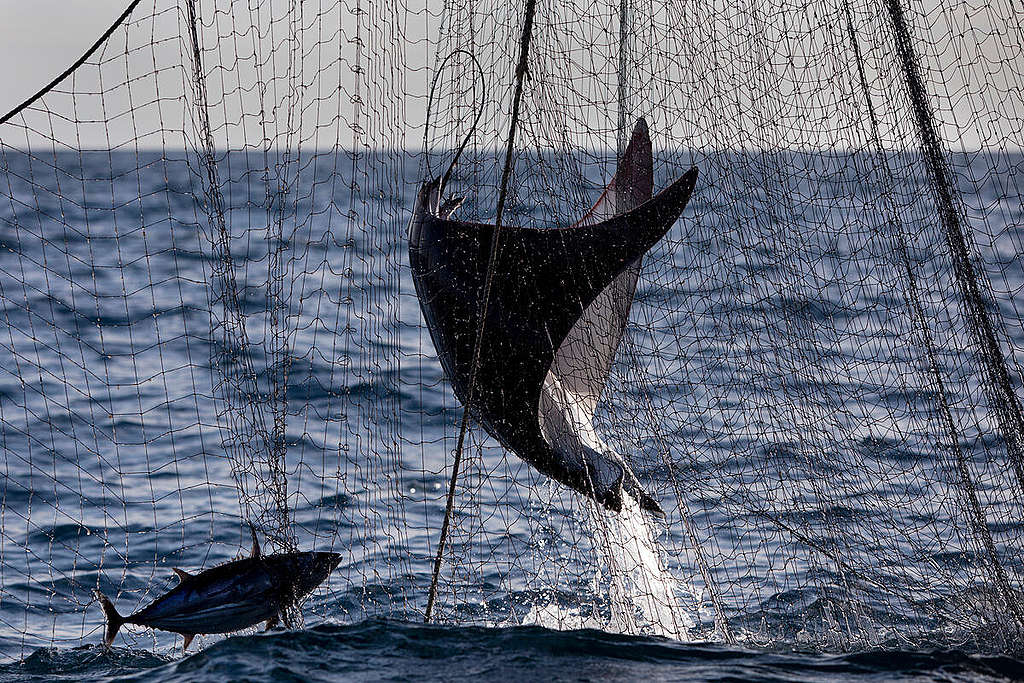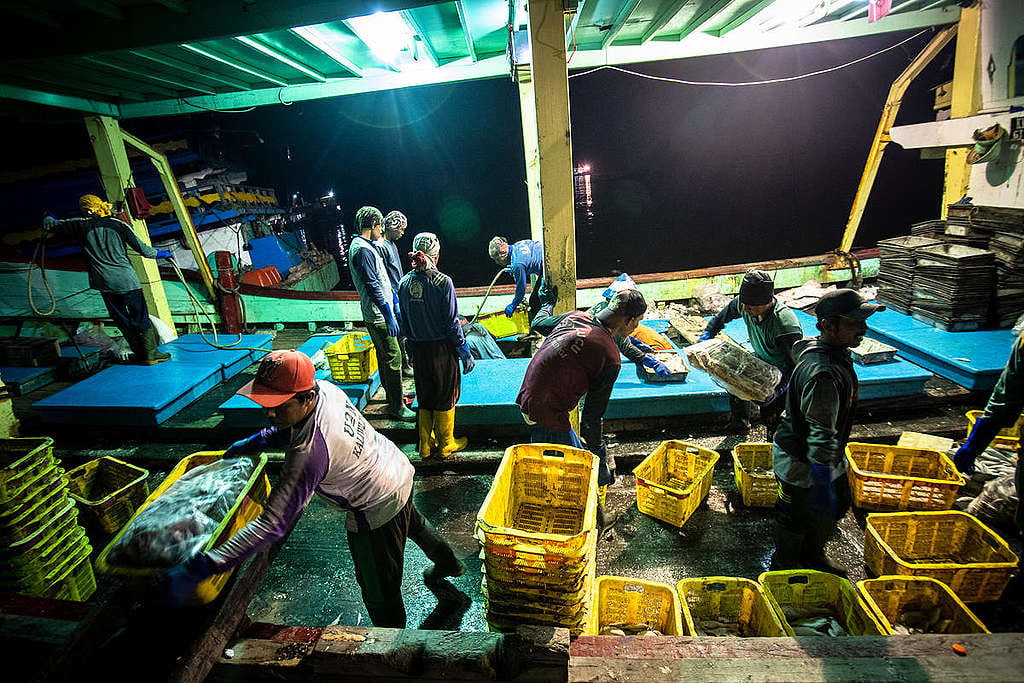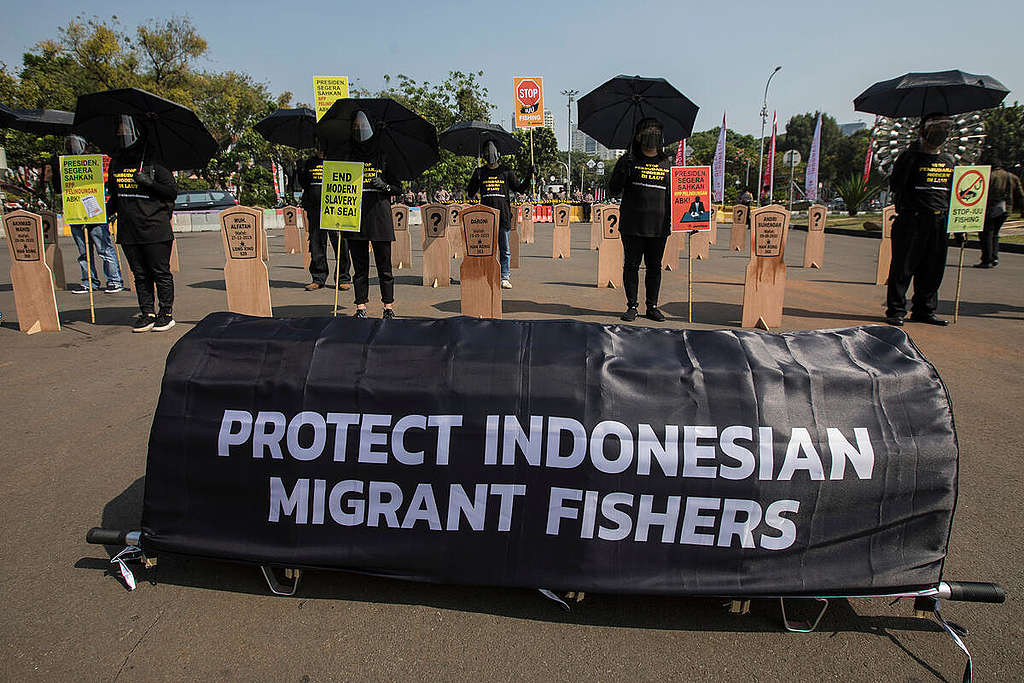The "high seas". For the uninitiated, a mere mention of the phrase throws up images of a vast never-ending expanse of pristine blue waters. But in reality, we know this vast expanse is far from pristine – threatened as it is by a toxic cocktail of climate change, plastic pollution, and the potential threat of deep-sea mining. Add to this mix the wildly destructive practices involved in high seas commercial fishing and we've got a recipe for disaster.
You likely have heard of the ecologically destructive impacts of industrial-scale high seas fishing. Think of that iconic scene near the end of "Finding Nemo" when the gang finds themselves caught in a monstrous purse seine net along with a school of tuna. While these fictional characters manage to escape, real fish in the ocean aren't as lucky.
Industrial fishing practices like purse seining are driving down fish stocks by taking more fish than are replenished, even catching species that we don't eat or use, and emptying out our oceans. Bottom trawling nets that drag across the ocean floor are destroying everything in their path. By now, we've all seen countless images of helpless turtles caught in drifting nets. But did we know that in addition to being ecologically destructive, high seas industrial fishing is also largely unprofitable?

A 2018 study by ENRIC SALA & Others that used satellite data and machine learning to estimate high-seas fishing effort, costs, and benefits, found that up to 54% of high seas fishing grounds would be unprofitable if not propped up by government subsidies and extremely low labour costs. Government subsidies have been known to prop up several ecologically damaging and unprofitable industries (*ahem* fossil fuels), so this is hardly surprising. While it's easy to estimate the role that subsidies play in propping up this industry, it's much more difficult to determine exactly how much of this industry is subsidized by low labour costs.
The secrecy and lack of data around labour costs meant that researchers had to work with low and high estimates to determine profitability. Their calculations found that even with the lowest possible estimates of labour costs, around 19% of the world's high seas fishing grounds would be unprofitable, and with higher estimates, this would jump to a staggering 30%.

As fish populations collapse and fishing vessels have to go further out at sea, transportation and refrigeration costs have increased. While these costs are fixed, labour costs are more flexible. This is especially true far out at sea, where isolation and lack of oversight render fishers – who are often migrants with few legal protections – more vulnerable to debt bondage, wage deductions, long working hours, and even physical abuse. Shocking reported cases of abuse and even deaths of fishers aboard vessels have further highlighted the extreme and systemic issues of forced labour in this industry. In April, a Taiwan court indicted nine people, including the captain and first mate of the fishing vessel Da Wang, over the forced labour and physical abuse of more than 20 Indonesian and Filipino workers. It's alleged that the migrant fishers were beaten and forced to work up to 20 hours a day; and that some Muslim employees were given no choice but to eat pork, which is strictly prohibited by their religion. The prosecutor's office not only accused the captain and the chief officer for abuses but also persecuted recruitment agents and vessel owners.

But successfully capturing culprits and protecting migrant fishers is extremely rare, especially in an industry that engages in illegal, unreported and unregulated (IUU) fishing. This practice is essentially crime on the high seas, in which not only destructive fishing practices take place, but also human rights abuses. It threatens the economic security of many fishing nations and puts law-abiding fishing communities and local seafood producers at a disadvantage.
For several years now, the global Greenpeace network has shone a light on the inhumane conditions faced by migrant fishers aboard high-seas fishing vessels, so we know that combating IUU is not easy. But there's a place where we can start. Our local corporate grocer and tuna brands may not directly employ the migrant fishers who spend months or even years at sea hauling thousands of pounds of tuna for over 16 hours a day, but their sourcing policies and business practices set the tone for the entire industry. These companies have a responsibility to enact policies that ensure the fish they sell is not tainted by environmental and human rights abuses.
We can hasten this industry shift by demonstrating that business as usual will not profit. We can try to reduce how much seafood we eat and choose local sustainable seafood where possible. Illegally caught fish is not at all palatable, and small scale fisheries and traditional and subsistence fisherfolk all around the world are proving that there is a better way to catch and distribute seafood. It's past time we look to them and demand a better normal for the world's fisheries.
Mallika Talwar is a Senior Oceans Campaigner on the Beyond Seafood team for Greenpeace US. This blog has been adapted from GP US.






